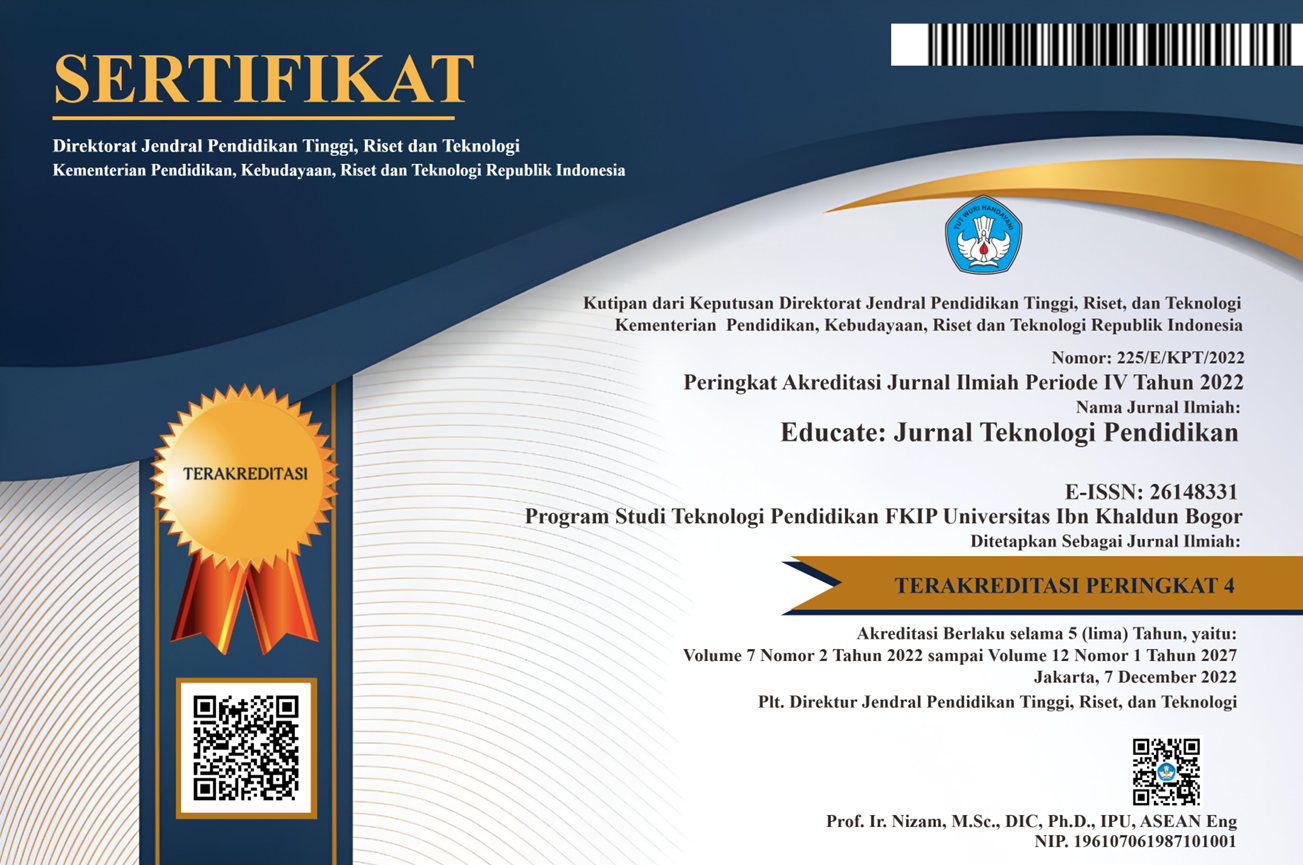THE ROLE OF THE PHILOSOPHY OF SCIENCE IN THE DEVELOPMENT OF EDUCATIONAL TECHNOLOGY
DOI:
https://doi.org/10.32832/educate.v10i1.18210Keywords:
philosophy of science, educational technology, technological developmentAbstract
Philosophy of science, as a discipline that examines the nature of knowledge, the ways of acquiring knowledge, and its application in human life, plays a strategic role in understanding and formulating the direction of educational technology development. This research aims to explore the role of the philosophy of science in developing educational technology, highlighting how philosophical thinking can guide the design, implementation, and evaluation of more humanistic and meaningful educational technology. This research uses a qualitative approach with descriptive analysis to explore the relevant literature on the relationship between the philosophy of science and educational technology. The research results show that the philosophy of science provides a strong foundation for understanding how educational technology can be used to support more effective, inclusive, and sustainable learning. Moreover, the philosophy of science plays a role in guiding educational technology to remain oriented towards profound educational values, such as freedom of thought, critical thinking, and creativity. The conclusion of this research is that the philosophy of science serves as an important theoretical foundation in the development of educational technology and as a critical reflection tool necessary to create a balance between technological advancement and profound educational goals.
References
Aldianti, Salsabilla Fortuna Sari. 2024. Peran Filsafat dalam Pengembangan Ilmu Pengetahuan dan Teknologi di Era Modern. Jurnal Penelitian Ilmu Humaniora. Vol. 4 No. 3. Hal. 90 – 96
Alfiyanti, Diana Gusti.dkk.2022. Peran Filsafat Ilmu Dalam Perkembangan Ilmu Pengetahuan Dan Teknologi Di Era Revolusi Industri 4.0. Didaktik : Jurnal Ilmiah PGSD. Vol. 8 No. 2
Budiatmaja, Rudy.dkk. 2024. Korelasi Filsafat dan Ilmu Pengetahuan pada Perkembangan Teknologi dan Kehidupan Peradaban Manusia Masa Kini. Proceedings Of The National Conference On Indonesian Philosophy And Theology. Vol. 2 No. 2
Borkowski, N. (2002). "Philosophy and Educational Technology: A Framework for Research." Jurnal Educational Technology Research and Development
Carr, N. (2014). *The Shallows: What the Internet Is Doing to Our Brains*. W.W. Norton & Company.
Collins, A., & Halverson, R. (2009). Rethinking Education in the Age of Technology: The Digital Revolution and Schooling in America. Teachers College Press.
Dewey, J. (1916). Democracy and Education: An Introduction to the Philosophy of Education. Macmillan.
Freire, P. (1970). Pedagogy of the Oppressed. Herder and Herder.
Habermas, J. (1984). The Theory of Communicative Action. Beacon Press.
Handraini, Helti. Dkk. 2023. Peran Filsafat Ilmu Terhadap Dampak Perkembangan IPTEK. Journal Of Social Science Research. Vol. 3 No. 6
Heidegger, M. (1977). The Question Concerning Technology and Other Essays. Garland Publishing.
Heryadi, Alda Rachma dkk. 2024. Peran Filsafat Ilmu Dalam Perkembangan Ilmu Pengetahuan Dan Teknologi Di Era Modern Bagi Mahasiswa. Nusantara Journal of Multidisciplinary Science. Vol. 1, No. 9, Hal 680-687
Hidayati, N. (2020). "Filsafat Pendidikan dan Implikasinya terhadap Teknologi Pembelajaran." Jurnal Pendidikan dan Kebudayaan, 5(2), 123-135
Hirsch, E. D. (2006). The Schools We Need: And Why We Don’t Have Them. Random House.
Maslow, A. (1943). A Theory of Human Motivation. Psychological Review.
Moran, J. (2010). "Educational Technology and the Philosophy of Education." Journal of Philosophy of Education
Norton, P., & Wiburg, K. (2012). Teaching with Technology: Designing Opportunities to Learn. Cengage Learning.
Nugraha, Oggie Bima dkk. 2022. Peran Filsafat Ilmu Terhadap Perkembangan Ilmu Pengetahuan Dan Teknologi. Jurnal Pendidikan Dan Konseling. Vol. 4 No. 6
Nurhayati. 2021. Peranan Filsafat Ilmu Untuk Kemajuan Perkembangan Ilmu Pengetahuan. Tasamuh: Jurnal Studi Islam. Vol. 13, No. 2.
Paul, R., & Elder, L. (2006). *Critical Thinking: Tools for Taking Charge of Your Learning and Your Life*. Pearson.
Rizal, A., & Damanik, J. (2021). "Peran Filsafat Ilmu dalam Pengembangan Teknologi Pendidikan." Jurnal Teknologi Pendidikan, Vol. 23(1), 45-58.
Selwyn, N. (2016). Education and Technology: Key Issues and Debates. Bloomsbury Academic.
Sukardi, S. (2017). "Filsafat Ilmu dalam Konteks Pendidikan dan Teknologi." Jurnal Pendidikan dan Pembelajaran. Vol. 11(3), 199-210.
Syamsuddin, A., & Nurmalia, S. (2019). "Penerapan Filsafat Ilmu dalam Inovasi Teknologi Pendidikan." Jurnal Ilmu Pendidikan, 25(1), 15-29
Vygotsky, L. (1978). Mind in Society: The Development of Higher Psychological Processes. Harvard University Press.
Yulianti, E. (2018). "Filsafat Ilmu dan Dampaknya pada Teknologi Pendidikan." Jurnal Pendidikan dan Teknologi, 4(1), 32-40
Zuriah n. (2009). Metodologi Penelitian Sosial dan Pendidikan Teori-Aplikasi. Jakarta : Bumi Aksara
Downloads
Published
How to Cite
Issue
Section
License
Copyright (c) 2025 Alyan Fatwa

This work is licensed under a Creative Commons Attribution 4.0 International License.
| Authors grant the journal copyright of the work licensed under CC-BY-SA or The Creative Commons Attribution–ShareAlike License that allows others to share the work with an acknowledgement of the work's authorship and initial publication in this journal. | Penulis memberikan hak cipta karyanya kepada jurnal yang dilisensikan dengan CC-BY-SA or The Creative Commons Attribution–ShareAlike License yang memungkinkan orang lain untuk menggunakan karya dengan pengakuan kepengarangan karya dan publikasi awal dalam jurnal ini. |









